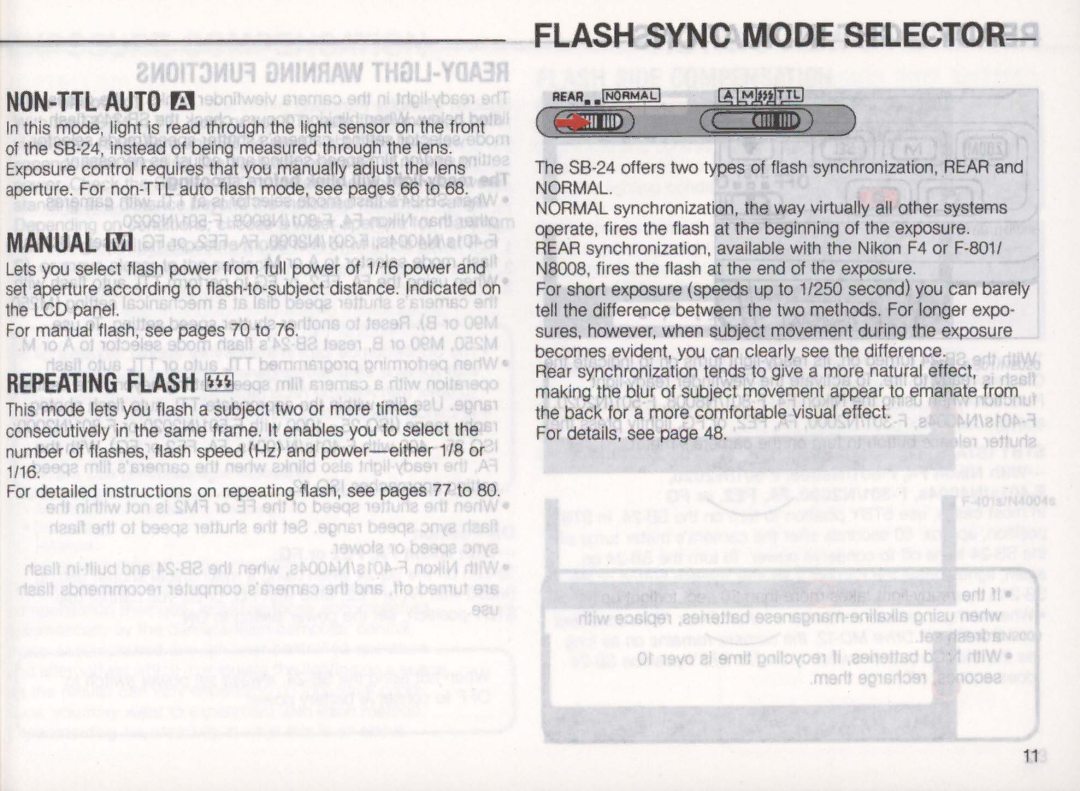Nikon
CONTENTS------------------------------------~
Repeating FLASH-For Multiple Exposure
For Shooting with Varied Lens Apertures
Manual FLASH-You Make All The Decisions
Thank you for purchasing the Nikon Autofocus 8peedlight
FOREWORDI~~~~~
Page
NOMENCLATURE----------------------------~~~
Used for manual-exposure multiple flash operation see
Sync/multiple flash terminal
IillI
5 2 3 4 6 9 1318 m
Usable Flash Modes with Your Camera
Pa...ges25to49
~tD
S8-24 offers two types of flash synchronization, Rear
NON-TTL Auto f!1
Ready-light will blink before shooting
READY·L1GHT Warning Functions
Or move closer to the subject
After shooting
On Position ···With Nikon FA, FE2 or FG
Special Standby Function
Exposure compensation
Exposure Compensation
Lighting Manipulation
Camera Side Compensation
Installing Batteries
Camera with other finders
Attaching Flash Unit to Camera Accessory Shoe
For Nikon F3·series camera with DE·2 or DE·3 finder
Firmly tighten the locking wheel
~t~1
Inn
6 9 1318 mJ
60.8 1 1.5
With F4, F·801/N8008 or F·401s/N4004s Turn on the camen
Adjusting Flash Head
91318m
345 7101520304060ft
Zoo?1 ~mm
346 91318m
60.8 1 1.5 2 3 4 6 9 1318 m
811.52 3 4 6 91318m
Setting Angle of Coverage
For other camerallens combinations
52 3 4 6 91318m
Pages 25 to
Metering system
Camera
FILL-FLASH Photography
Matrix Balanced FILL-FLASH
Standard TTL Flash
CENTER-WEIGHTED FILL-FLASH
With F·801/N8008
With F4
0.8 1 1.5 2 3 4 6 91318m
Set the S8-24s mode selector to TTL
Matrix Balanced FILL-FLASH Operation
For Center-Weighted Fill-Flash Operation
Programmed Auto Exposure Mode
Overexposure warning
~P~QtD,-F22 ~1I
60.~~~+!318m
Shutter·Priority Auto Exposure Mode
FEE, but will fire
With F-801/N8008 camera
Check the exposure
With F4 camera
~ l.J
Aperture·Priority Exposure Mode
BJ-I
Overexposure warning
IDJ \£L.J,I F
Confirm the ready-light and in-focus
With other lenses
Manual Exposure Mode
Desired value
IIII~
Aperture to your selected lens aperture
For example With zoom setting at 35mm
Confirm the shooting distance range in the S8-24s LCD panel
With an AF Nikkor or Nikkor lens w/built·in CPU
4 5 7 1015 20 304060 ft
Flash Exposure Compensation
60.811.52 3 4 6 91318m
60.8 11.5 2 3 4 6 9 1318 m
Illl~ l~...bn.....,J
Front-curtain sync
REAR-CURTAIN Sync FLASH-For Natural Light Flows
Matrix Metering with 50mm fl1.4 lens at ISO
Exposure mode
TTL Auto lIn Flash with Nikon F·401s/N4004s
4 5 7 10 1520304060 ft
60.8 1 1.5 2 3 4 6 91318 m
4 5 7 1015 0304060ft
1318m
For example
Lightly press the shutter release button and confirm
Ready-light and in-focus indicator are on
0.8 1 1.5 2 3 4 6 91318m 4 5 7 1015 20304060ft
Did
For blinking ready-light warning, see pages 12 to
FdJ
Automatic Balanced FILL-FLASH
FA, FE2 and FG ISO 25 to
Set the cameras film advance mode to single-frame shooting
501/N2020 and F-301/N2000
Set the lens to its minimum aperture Highest f-number
For example
DUAL, P, or PHI. ForF-501/N2020 only
4 5 7
TTL Auto Flash
For blinking ready-light warning, see pages 12 to
~lF
Exposure Compensation with Camerasexposure Dial
FILL-FLASH in TTL Auto iIll Flash Mode
~~~
Lens only
Aperture setting
For greater depth of field
Maximum Lens aperture
0.8 1 1.5 2 3 4 6 91318m
LJI~
For example
Fully depress the shutler release button to take the picture
Test Firing for Non-TTL Auto Flash
ISO film speed Shooting distance range
6 91318 m
Level of flash power full power 111, 1/2, 1/4, 1/8, or 1/16
60.8 1 1.5 2 3 4 6 9 1318 m
Zoom mm F MIII-D
0.8 1 1.5 ~~\4 6 91318 m 4 5 7 10 h520304060 f t
With other combinations
Fully depress shutter release button to take the picture
Batteries
4 5 7101520304060ft
Manual FILL-FLASH
60.811.52 346 91318m 57101520304060ft
60.811.52 3 4 6 91318 m
Select the desired shutter speed
60.811.52 3 4 6 91318m 4 5 7101520304060ft
Zoom I -=-mm e.LI MIl
0.8 1 1.5 2 3 4 6 91318m 345 7101520304060ft
01520304060ft
101520 4060ft
7101520304060ft
91318 m
For multiple flash exposures on one frame, use the S8-24
345 7101520304060ft 1520304060ft
60.811.52-3 4 6 91318m 4 6 91318m
With other combinations
When using Nikon F4 or F·8011
1Hz
91318m
Subject overlap
ZooM mm , MI U
Background brightness
800 1600
See table for the guide numbers at various film speeds
Guide number at various film speeds
200
Diffusing LlGHT ~~~~
Rotation to right 900 -front-to left
Bounce Flash Photography Procedure
~ ~1 1b 52!i3t~060ft
Using a Diffuser
Multiple Flash PHOTOGRAPHY-----------~
As the master flash unit, use Nikon Speedlight S8-24, S8-23
TTL Multiple Flash Photography
ID---+
~~~~~~~~
Tt~~--~ +~w~~~~lD~
Sc-,a
SC-19 SC-18
Accessories for TTL Multiple Flash
Manual Multiple Flash Photography
CLOSE·UP Flash Photography in TTL Auto Flash Mode
Tips on Speedlight Care
Page
Continuous use
Temperature
Battery brand
New batteries
Fill-flash
Center-Weighted Metering
Balanced fill-flash operation
Exposure control for available light
Red-eye
Hertz
Matrix Metering System
Non-TTL Auto
Zoom capability
Electronic
Construction
Guide number
Dimensions
Range in a mode Mode
Shooting distance 0.6-20m2-66ftrange in TTL mode
Other features
Nikon
88-24
Meters Im~
Setting UP the 58·24
Close the lid, then slide the cover back to close
Check battery power
Push the M button
Confirm TTL ~ mark is on If ~ mark is blinking
Confirm subject is in focus
Confirm the ready·light is on
Ready-light does not light up
LCD panel display does not appear
Released even with the ready-light on
Incorrect display appears

